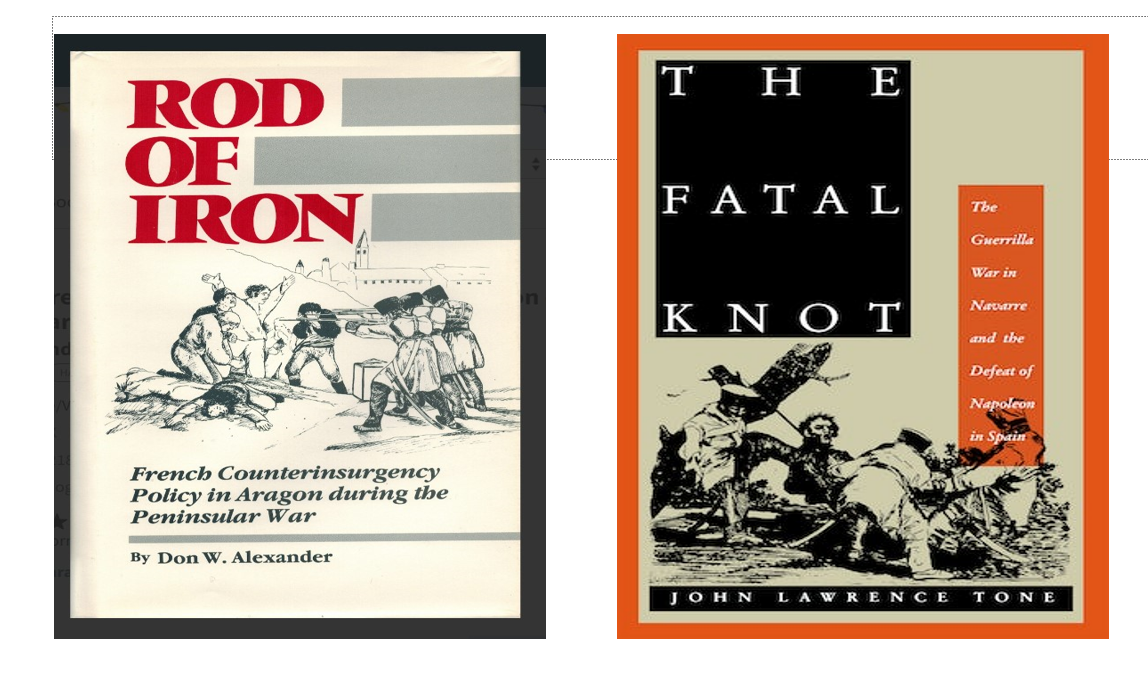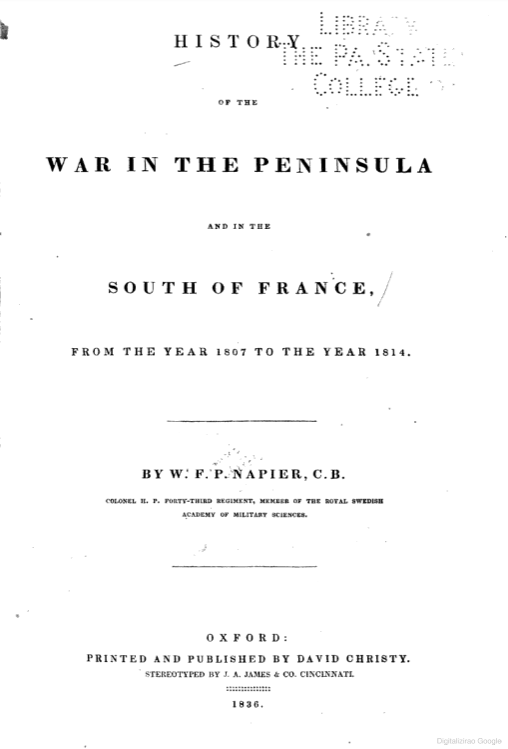
The covers for Rod of Iron by Don W. Alexander and The Fatal Knot by John Lawrence Tone
The following is an excerpt, with images and subtitles added, from Benjamin J. Swenson’s dissertation at Pompeu Fabra University, Barcelona, titled, “Rewriting the ‘Detestable’ Rules of War: The ‘Guerrilla System’ and Counterinsurgency in Napoleonic Spain and the Mexican-American War, 1808-1848,” and gives a brief overview of the historiographical debate over the Napoleonic War in Spain:[1]
Competing Narratives
The main dispute within the historiography of the Peninsular War has always been (and remains) a competing narrative between British and Spanish historians. Even the names of the wars are different – with the Spanish using War of Independence and the British using Peninsular War because it includes their campaign in Portugal. In simplified form, British historians have relegated the efficacy of the guerrilla campaign in Spain while simultaneously bolstering the Duke of Wellington’s contribution to winning the war. William Napier, an early British historian of the war, expressly wrote in the introduction of History of the War in the Peninsula (1828) of his desire to redirect the historiography in favor of the British.
“The Spaniards have boldly asserted, and the world has believed, that the deliverance of the Peninsula was the work of their hands: this assertion so contrary to the truth I combat.”[2]

In contrast, Spanish historians have focused on the insurgency and its main guerrilla chieftains, such El Empecinado (1775-1825) and Espoz y Mina (1781-1835). The Anglo-Spanish historiographical rivalry has been ongoing since the war ended in 1814, and both sides have validity. Military scholars, on the other hand, simply avoid the argument altogether by classifying the war a hybrid war (or compound war) to better analyze the totality of the conflict.
Rod of Iron, The Fatal Knot, and the “Riddle”
Don W. Alexander was the first historian to depart from that approach – that is, Alexander focused on French counterinsurgency using French sources and uncovered the undeniable stress that the Spanish guerrilla movement inflicted on the army of occupation. Built on his previous scholarship in the French Archives de la Guerra and the Archives Nationales, in 1985 Alexander published Rod of Iron: French Counterinsurgency Policy in Aragon during the Peninsular War.[3] Since then, other historians, such as David Gates (The Spanish Ulcer, 1986) and more recently John Tone in The Fatal Knot (1995) have added to the scholarship supporting the efficacy of the insurgency. Tone addresses the “riddle” of how the combined British and Spanish effort resulted in French defeat by noting that “the Allies never faced the bulk of the Napoleon’s armies” because the insurgency “forced Napoleon to expend hundreds of thousands of French troops in occupation duties, eliminating the emperor’s numerical superiority over the allies.”[4]
[1] Benjamin J. Swenson, “Rewriting the ‘Detestable’ Rules of War: The ‘Guerrilla System’ and Counterinsurgency in Napoleonic Spain and the Mexican-American War, 1808-1848.”PhD diss., Pompeu Fabra University (UPF), Barcelona, 2021, pp. 29–30. For a look at how the Peninsular War informed the Mexican-American War, see Benjamin J. Swenson, The Dawn of Guerrilla Warfare: Why the Tactics of Insurgents against Napoleon failed in the US Mexican War (Barnsley, UK: Pen and Sword, 2023).
[2] William F.P. Napier, History of the War in the Peninsula and in the South of France, Vol.1 (London: Thomas and William Boone, 1828), ix. For an example of recent bias against the Spanish, see: Charles Esdaile, The Peninsular War: A New History (London: Palgrave Macmillan, 2003). See also: Huw J. Davies, Spying for Wellington: British Military Intelligence in the Peninsular War (Norman: The University of Oklahoma Press, 2018).
[3] Don W. Alexander, “French Military Problems in Counterinsurgent Warfare in Northeastern Spain, 1808-1813.” Military Affairs 40, no. 3 (Oct. 1976): 117-122; Alexander, “French Replacement Methods during the Peninsular War, 1808-1814.” Military Affairs 44, no. 4 (Dec. 1980): 192-197; Alexander, Rod of Iron: French Counterinsurgency Policy in Aragon during the Peninsular War (Wilmington, DE: Scholarly Resources, 1985).
[4] John Lawrence Tone, The Fatal Knot: The Guerrilla War in Navarre and the Defeat of Napoleon in Spain (Chapel Hill: The University of North Carolina Press, NC, 1995), 4-5; David Gates, The Spanish Ulcer: A History of the Peninsular War (London: George Allen & Unwin, 1986). Spanish works on the guerrilla movement include; Florentino Hernández Girbal, Juan Martín, El Empecinado: Terror de los franceses (Madrid: Ediciones Lira, 1985); Manuel Ortuño Martínez, Vida de Mina: Guerrillero, liberal, insurgente (Madrid: Trama Editorial, 2008); Ramon Guirao Larrañaga, Guerrilleros y Patriotas en el Alto Aragón (1808-1814) (Huesca: Editorial Pirineo, 2000); Pedro Pasual, Curas y frailes guerrilleros en la guerra de la independencia (Zaragoza: Institución Fernando el Católico (IFC)), 1999; Díaz Terrejón, Francisco Luis, “El movimiento guerrillero en España durante la ocupación napoleónica (1808-1814).” In Iberoamericana (2001-) Nueva época, Año 8, no. 31 (Sept. 2008): 129-135.
